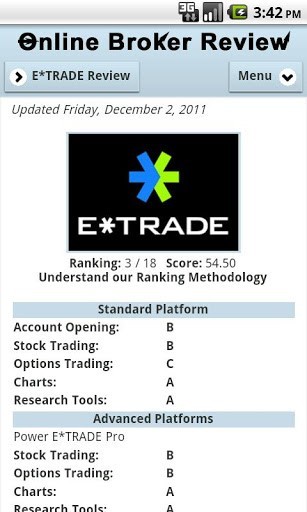5 Best Online Brokerages
Post on: 13 Май, 2015 No Comment

Wise Bread Picks
Starting to invest is scary enough. Having to choose an online brokerage firm adds to the complexity of launching your investment portfolio.
You could choose a full-service brokerage to hold your hand. Individual transaction fees are steep, though, making this unaffordable for the investor building a portfolio through monthly contributions. Plus, the difference in service is becoming negligible for the average investor as online firms increasingly expand their capabilities.
Simply picking any online brokerage and getting started is a good-enough strategy, especially if you initiate just a few transactions each year or invest almost exclusively in no-transaction-fee mutual funds. But having an account with a brokerage staffed with professionals who can help you get started and grow with your needs is ideal.
Brokerage Evaluation Criteria
I looked at several factors when evaluating the online brokerages for this list.
- Low fees for equity trades, mutual fund transactions, and account management
Every broker has its strengths, even the ones not listed among these 5 Best. You could find even lower standard prices for equity trades with other brokerages, but these may not offer any commission-free ETFs, charge a transaction fee for all mutual funds, and provide limited service.
The regular investor who sets aside money routinely, makes portfolio changes a few times each year, and needs expert guidance occasionally can find what’s needed here.
5 Best Online Brokerages
E*Trade focuses on online trading for retail investors but has extensive research tools and a strong customer service presence.
The company’s fee structure and account minimums are friendly to novice investors. Stock trades are $9.99, slightly higher than most online brokers. However, automated phone trades and agent-assisted trades are available at lower-than-average costs.
Commission-free ETFs and over 1,300 no-transaction-fee mutual funds are available to customers. Transaction fees for the purchase and sale or redemption of mutual funds are just $19.99, lower than many online brokerages.
There are no account maintenance fees. Plus, there is no minimum to open an IRA and just a $500 minimum for a regular brokerage account.
2. TD Ameritrade
TD Ameritrade was formed as merger between TD Waterhouse and Ameritrade in 2006. A discount brokerage since 1975, the company has updated its platforms from telephone-based trading to online trading and now mobile capabilities. In 2009, TD Ameritrade acquired thinkorswim.com, which specializes in options trading.
An online stock or ETF trade is $9.99 although commission-free ETFs are available. Online transaction fees for mutual funds are $49.99 whether you are buying or selling, unless you choose among the brokerage’s hundreds of no-transaction-fee funds.
There are no account maintenance fees. There is no account minimum for a regular brokerage account or an IRA.
Scottrade specializes in inexpensive equity trades for the DIY or self-directed investor. Education, customer service, and investor support are available through its website, telephone, and more than 500 branch offices.
Online stock and ETF trades are $7.00. Transaction-fee mutual fund purchases and redemptions are just $17, and there are over 3,000 no-transaction-fee mutual funds available through the company.
There are no account maintenance fees. The account minimum for brokerage and IRA accounts is $500.

4. Charles Schwab
Charles Schwab started its discount brokerage service soon after the SEC deregulated fees for securities transactions in 1975. This innovative concept served DIY investors with rates heavily discounted compared to full-service firms.
The company still has relatively low fees but also has research, portfolio management, and financial advisory services available through its online presence and brick-and-mortar offices.
Online equity trades are $8.95. The company offers commission-free ETFs and no-transaction-fee mutual funds (which include its branded or proprietary funds). There is a $76 charge for online purchases of certain mutual funds but no charge for redemption or sale of these funds.
There are no fees to open or maintain an account. Account minimums are $1,000 for regular brokerage accounts and traditional and Roth IRAs but can be waived if you set up automatic monthly transfers of $100 or more.
Fidelity offers financial products and services to individual investors as well as employers and financial-services firms. As one of the largest mutual fund providers, the company was the first to sell mutual funds directly to individual investors through a toll-free telephone line in 1974.
Today, Fidelity offers online brokerage services that enable investors to build a portfolio with mutual funds as well as stocks, ETFs, and bonds. The online trading fee for stocks and ETFs is $7.95.
Mutual fund categories include proprietary Fidelity funds categorized as index, sector (e.g. information technology), and asset allocation (e.g. target-date) funds. Ten thousand mutual funds are available through Fidelity; over 4,900 of these carry no transaction fee. The cost to buy and sell transaction-fee mutual funds is $75.00 per transaction.
Account minimums are high at $2,500 for a regular brokerage account and either a traditional or Roth IRA. However, these can be waived if you sign up for automated monthly contributions.
Other Services
In addition to the products and services noted above, all of these online brokerages offer investor development and portfolio management tools, which may include:
- Educational videos and webinars.
Whether you engage a financial professional or invest on your own, these resources can be useful as a point of reference when developing tax strategies and making investment decisions.














